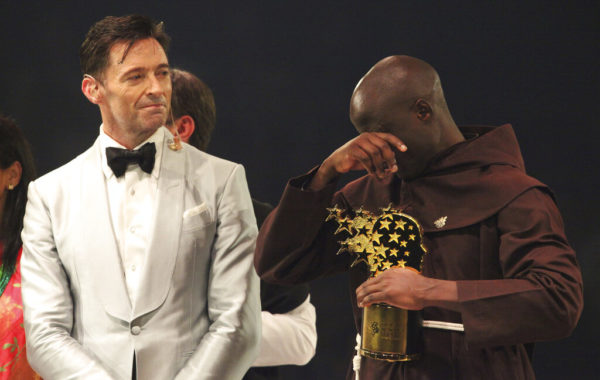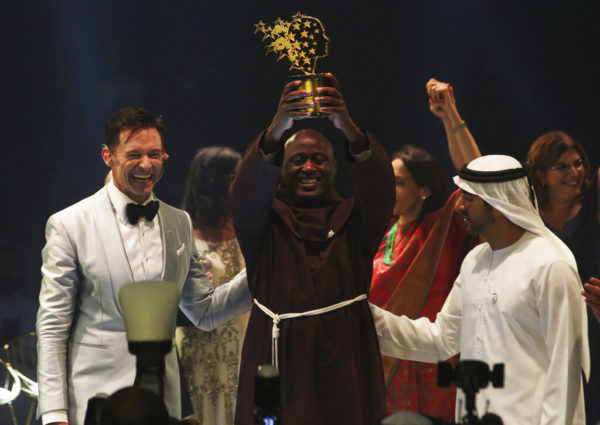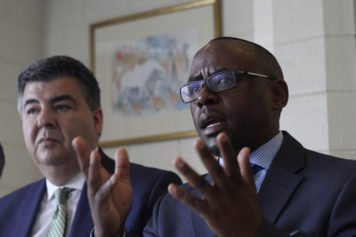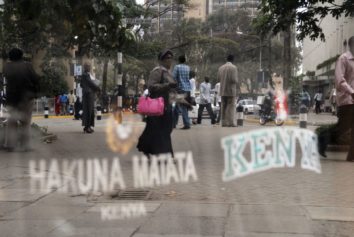A math and science teacher from rural Kenya, best known for donating 80 percent of his monthly salary to help the poor, just earned himself the title of best teacher in the world.
Peter Tabichi, who teaches at school with just one desktop computer and other resources that are severely lacking, was awarded $1 million as part of the Varkey Foundation’s Global Teacher Prize on Sunday. The award, presented by Australian actor Hugh Jackman during a ceremony in Dubai, recognizes Tabachi’s “exceptional” impact on his students at Keriko Mixed Day Secondary School in Kenya’s remote Pwani Village.

Kenyan teacher Peter Tabichi, right, reacts as actor Hugh Jackman, watches after the teacher won the $1 million Global Teacher Prize in Dubai, United Arab Emirates, Sunday, March 24, 2019. Tabichi is a science teacher who gives away 80 percent of his income to the poor in the remote Kenyan village of Pwani. (AP Photo/Jon Gambrell)
“His dedication, hard work and passionate belief in his student’s talent has led his poorly-resourced school in remote rural Kenya to emerge victorious after taking on the country’s best schools in national science competitions,” the foundation wrote.
The 36-year-old, who is also a Franciscan friar, beat out nine other applicants and 10,000 other candidates from 176 countries for the top spot, BBC News reported. 2018’s winner was Andria Zafirakou, an art teacher from north London.
“Every day in Africa we turn a new page and a new chapter,” Tabichi said. “This prize does not recognize me but recognizes this great continent’s young people. I’m only here because of what my students have achieved. This prize gives them a chance. It tells the world that they can do anything.”
For Tabichi’s students, life has been far from easy. The semi-arid area of Kenya’s Rift Valley experiences drought and famine quite frequently, and many go hungry. Ninety-five percent of his pupils come from poor families, and almost a third are orphans or only have one parent. Issues of drug abuse, teenage pregnancy, young marriage and dropping out of school are also common, according to the Varkey Foundation.
The schooling situation isn’t much better, as classrooms with poor internet and a student-teacher ratio of 58:1 makes learning an uphill battle. The school’s lack of resources forces Tabachi to get much of his online educational content from internet cafes, which he uses offline during class.
The math teacher said part of the challenge has also been getting the local community to see the value of getting a good education, particularly families with daughters who would rather see their children married early than in a classroom. Over the years, he’s made a concerted effort to visit families whose kids are at risk of quitting school and encourages them to keep learning, instead.
“As a teacher working on the front line, I’ve seen the promise of its young people — their curiosity, talent, their intelligence, their belief,” Tabachi said. “Africa’s young people will no longer be held back by low expectations. Africa will produce scientists, engineers, entrepreneurs whose names will be one day famous in every corner of the world. And girls will be a huge part of this story.”

Kenyan teacher Peter Tabichi, center, actor Hugh Jackman, left, and Dubai crown prince Sheikh Hamdan bin Mohammed Al Maktoum, right, react after Tabichi won the $1 million Global Teacher Prize in Dubai, United Arab Emirates, Sunday, March 24, 2019. Tabichi is a science teacher who gives away 80 percent of his income to the poor in the remote Kenyan village of Pwani. (AP Photo/Jon Gambrell)
According to his profile, Tabachi’s efforts have doubled enrollment at Keriko Mixed Day Secondary School in just the last three years. Achievement among girls has also seen a boost, with young women now leading the boys in all test sets in the last year alone.
What’s more, Tabachi has led the school’s Science Club to compete in both national and international competitions. The Mathematical Science team recently qualified to compete in the INTEL International Science and Engineering Fair in Arizona later this year. His students also won an award from The Royal Society of Chemistry after using plant life to generate electricity.
“I feel great. I can’t believe it,” Tabachi said during his acceptance speech. “I feel so happy to be among the best teachers in the world, being the best in the world.”
The teacher said he plans to use the $1 million prize to help improve the school and feed the poor.


